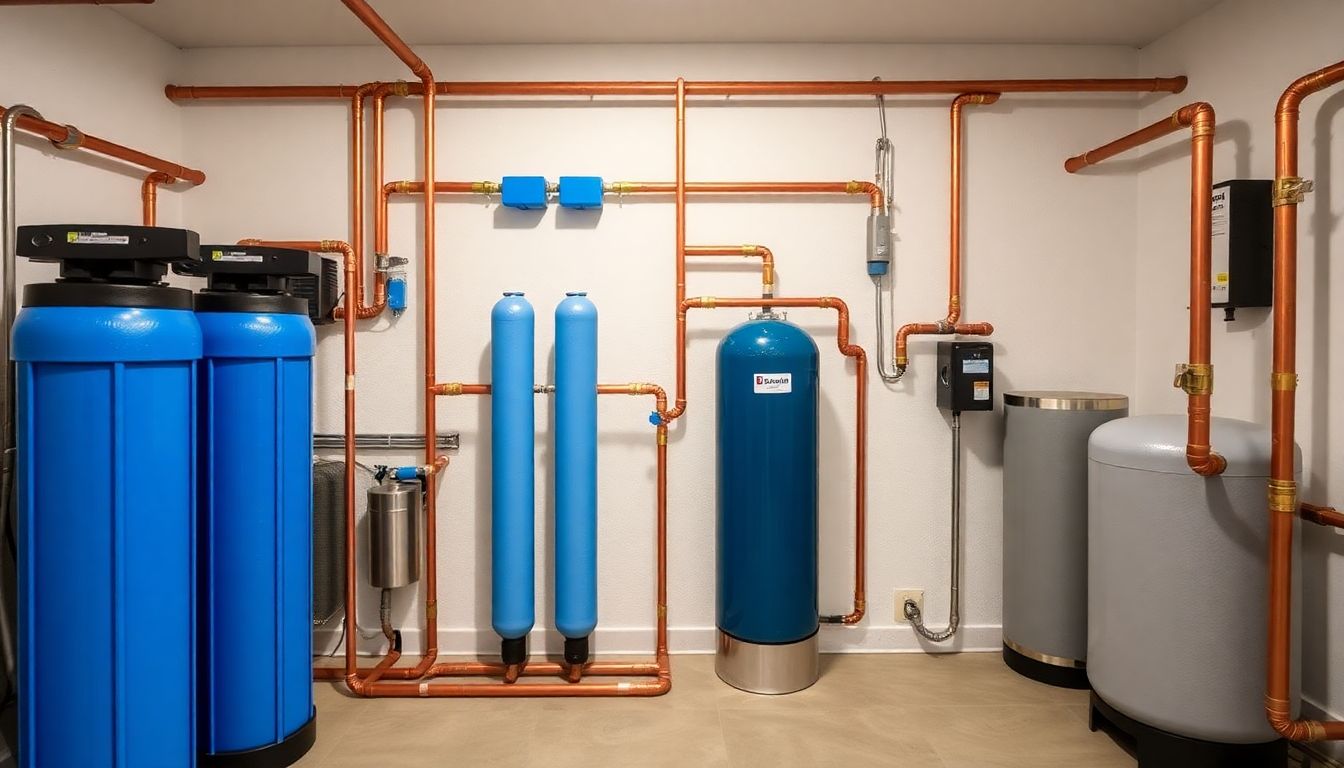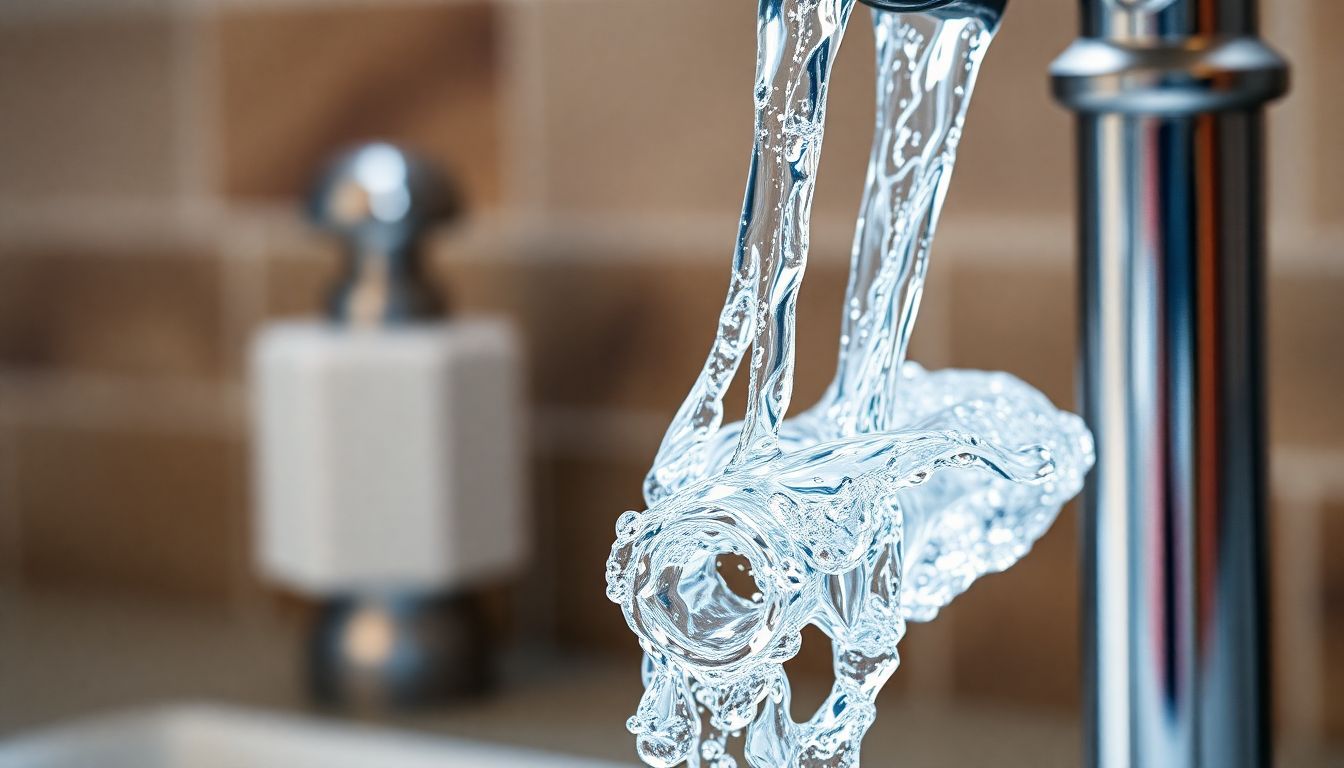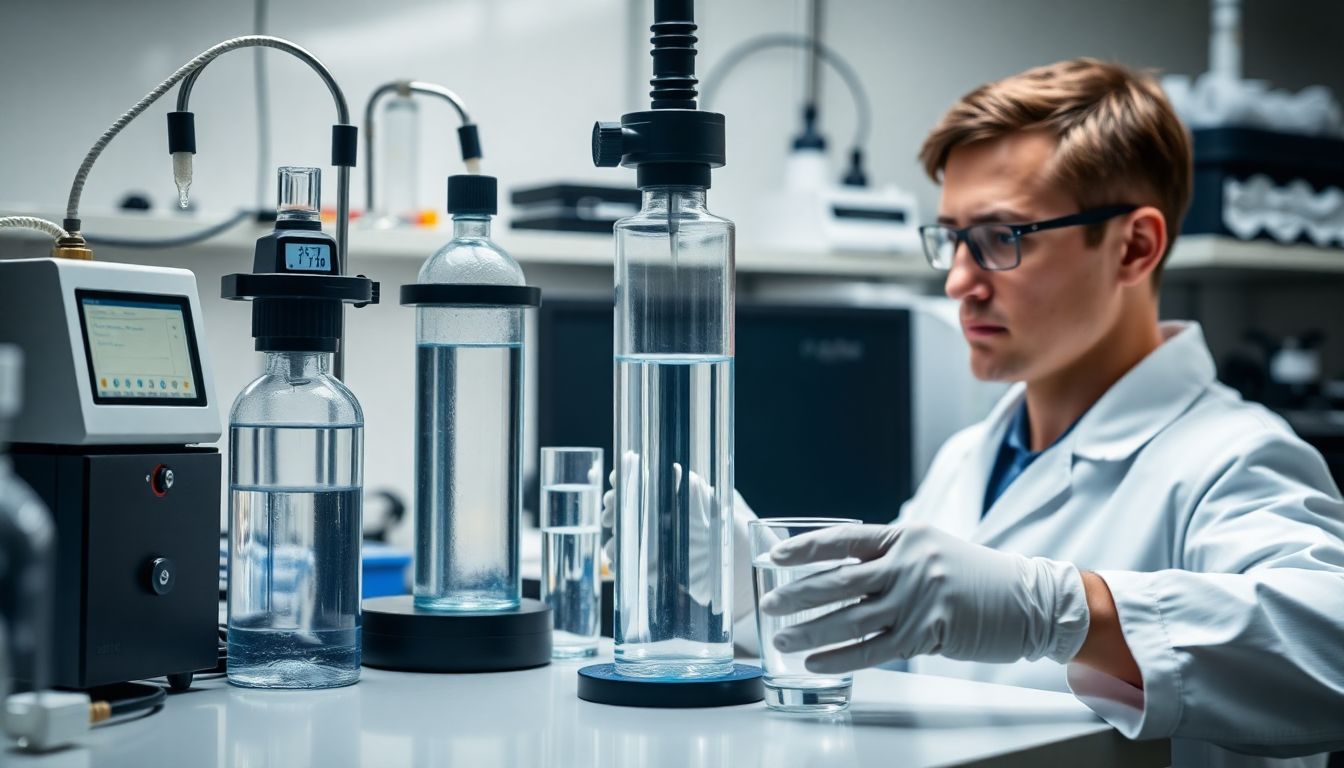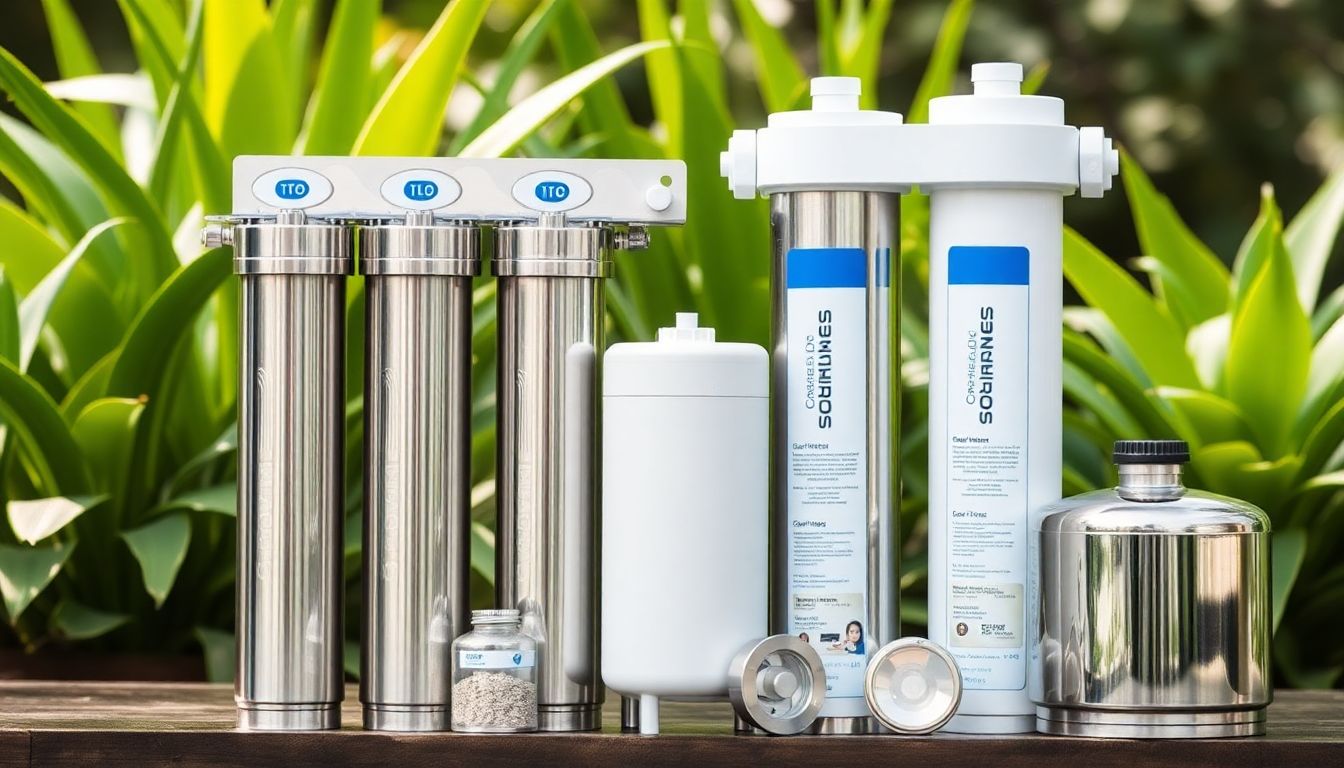What Is a Full House Water Filtration System?
A full house water filtration system treats all the water entering your home at the main water line. Think of it as a gatekeeper that cleans every drop before it reaches your faucets, showers, appliances, and toilets.
Unlike point-of-use filters that attach to individual faucets, whole home systems filter water at the source. This means every water outlet in your house gets clean, filtered water. Your morning shower, dishwasher, washing machine, and drinking water all benefit from the same filtration process.
These systems typically install where your main water line enters your home, before the water heater and pressure tank. The filtered water then flows through your existing plumbing to every fixture and appliance.
At Top Quality Plumbing Services, we install various types of whole home filtration systems depending on your water quality and specific needs. Each system targets different contaminants and provides unique benefits for Houston homeowners.

Types of Whole Home Water Filtration Systems
Several types of full house water filtration systems address different water quality issues. Your choice depends on what contaminants exist in your water supply and your household’s specific needs.
Sediment Filters
Sediment filters remove physical particles like sand, dirt, rust, and debris from your water. These work as the first line of defense in most whole home systems. They protect your plumbing and other filtration components from larger particles that could cause damage or reduce efficiency.
Carbon Block Filters
Carbon filters excel at removing chlorine, chemicals, and improving taste and odor. They use activated carbon to absorb contaminants as water passes through. Many Houston homes benefit from carbon filtration because city water contains chlorine for disinfection.
Reverse Osmosis Systems
Reverse osmosis systems push water through a semi-permeable membrane that removes dissolved solids, heavy metals, and many other contaminants. These systems provide the highest level of filtration but require more maintenance and produce some wastewater.
We often recommend combining different filter types in a multi-stage system. This approach tackles various contaminants effectively and provides comprehensive water treatment for your entire home.
Benefits of Installing a Whole Home Water Filter
Installing a full house water filtration system provides numerous advantages that extend far beyond just drinking water. These benefits impact your health, home, and wallet in meaningful ways.
Clean water throughout your home means better skin and hair health. Chlorine and other chemicals in unfiltered water can dry out your skin and make your hair brittle. Filtered shower water feels softer and leaves your skin feeling smoother.
Your appliances last longer with filtered water. Water heaters, dishwashers, washing machines, and ice makers all perform better and require less maintenance when they’re not dealing with sediment, minerals, and chemicals. This translates to fewer repair calls and longer appliance life.
Filtered water tastes and smells better for drinking, cooking, and making beverages. You’ll notice the difference in your morning coffee, tea, and even ice cubes. Cooking with filtered water also improves the taste of soups, pasta, and other dishes.
Whole home filtration eliminates the need for multiple point-of-use filters throughout your house. You won’t need to replace pitcher filters, faucet filters, or shower filters anymore. This convenience saves time and money over the long term.
Common Water Quality Issues in Houston
Houston’s water supply faces unique challenges that make whole home filtration particularly beneficial. Understanding these local water quality issues helps you choose the right filtration system for your home.
Hard water is one of the most common problems we encounter. Houston’s water contains high levels of calcium and magnesium minerals that create scale buildup in pipes and appliances. You’ll notice white spots on dishes, soap scum in showers, and reduced efficiency in water heaters.
Chlorine levels in Houston’s municipal water supply are higher than many homeowners prefer. While chlorine disinfects water effectively, it creates a strong taste and odor that many find unpleasant. Chlorine also dries out skin and hair during showers.
Sediment and rust particles from aging infrastructure can affect water clarity and taste. These particles come from old pipes in the distribution system and can cause problems with appliances and plumbing fixtures.
Some areas of Houston also deal with elevated levels of total dissolved solids (TDS). These minerals and salts affect water taste and can contribute to scaling issues in appliances and plumbing systems.

How Much Does a Whole Home Water Filter Cost?
The cost of a full house water filtration system varies widely based on the type of system, your home’s size, and local water quality conditions. Understanding these cost factors helps you budget appropriately for your investment.
Basic sediment and carbon filtration systems typically range from $1,500 to $3,000 installed. These systems handle common issues like chlorine, sediment, and basic chemical contaminants. They’re often sufficient for homes with relatively good municipal water quality.
More advanced multi-stage systems cost between $3,000 and $6,000 installed. These systems combine multiple filtration methods and can address complex water quality issues. They’re ideal for homes with hard water, high chemical content, or multiple contaminants.
Premium reverse osmosis whole home systems range from $6,000 to $12,000 or more. These systems provide the highest level of filtration but require more complex installation and ongoing maintenance.
Factors That Affect Installation Costs
- Distance from main water line to installation location
- Plumbing modifications required for installation
- Type and complexity of filtration system chosen
- Local permit requirements and inspection fees
- Electrical work needed for UV sterilizers or other components
We provide detailed estimates that include all installation costs upfront, so you know exactly what to expect before we begin work.
Professional Installation vs DIY
While some homeowners consider installing whole home water filtration systems themselves, professional installation offers significant advantages. The complexity of these systems and local code requirements make professional installation the safer, more reliable choice.
Whole home filtration systems require modifications to your main water line, which involves shutting off water to your entire house. Mistakes during installation can result in flooding, property damage, or contaminated water supply. Professional plumbers have the tools and experience to handle these connections safely.
Local building codes often require permits for whole home filtration installations. We handle all permit applications and ensure your installation meets Houston’s plumbing codes. This protects you from potential fines and ensures your system operates safely.
Professional installation includes proper sizing and placement of your filtration system. We evaluate your water pressure, flow rate, and household usage to recommend the right system size and configuration. This ensures optimal performance and longevity.
Warranty coverage often requires professional installation. Many manufacturers void warranties if systems aren’t installed by licensed professionals. Our installations come with both manufacturer warranties and our own service guarantees.
Water Testing Before Installation
Testing your water before installing a filtration system is essential for choosing the right equipment. Different contaminants require different filtration methods, and testing reveals exactly what your water contains.
Basic water testing checks for common issues like hardness, chlorine levels, pH, and total dissolved solids. These tests help determine if you need sediment filtration, carbon filtration, or water softening capabilities.
Comprehensive testing includes analysis for heavy metals, bacteria, pesticides, and other potentially harmful contaminants. This level of testing is particularly important for homes with private wells or those experiencing unusual taste, odor, or appearance issues.
What Water Testing Reveals
Water testing provides specific information about contaminant levels in your supply. You’ll learn about mineral content, chemical presence, and biological contamination if it exists. This data guides our equipment recommendations and ensures you get a system that addresses your specific water quality issues.
Testing also establishes baseline measurements for evaluating your filtration system’s performance. After installation, follow-up testing confirms your system is working effectively and removing targeted contaminants.
We work with certified water testing laboratories to provide accurate, comprehensive analysis of your water supply. This professional testing ensures reliable results and appropriate system recommendations.

Maintenance Requirements for Whole Home Systems
Regular maintenance keeps your full house water filtration system operating efficiently and extends its lifespan. Different types of filters have varying maintenance schedules and requirements.
Sediment filters typically need replacement every 3-6 months, depending on your water quality and usage. Heavy sediment loads require more frequent changes, while cleaner water supplies allow longer intervals between replacements.
Carbon filters usually last 6-12 months before requiring replacement. You’ll notice when carbon filters need changing because chlorine taste and odor return to your water. Some systems include indicator lights or alarms that alert you when filters need attention.
Reverse osmosis membranes can last 2-3 years with proper maintenance. However, pre-filters in RO systems need more frequent replacement to protect the expensive membrane components.
Signs Your Filters Need Replacement
- Reduced water pressure throughout your home
- Return of chlorine taste or odor in your water
- Visible sediment or particles in water
- Unusual water color or cloudiness
- System pressure alarms or indicator lights
We offer maintenance service plans that include scheduled filter replacements and system inspections. This ensures your system operates efficiently and you never have to worry about forgotten maintenance tasks.
Choosing the Right System Size
Selecting the correct size for your whole home water filtration system ensures adequate water flow and pressure throughout your house. Undersized systems restrict water flow, while oversized systems waste money and space.
System sizing depends on your home’s water usage patterns and peak demand periods. We calculate flow rates based on the number of bathrooms, appliances, and simultaneous water usage scenarios in your household.
Most residential whole home systems handle flow rates between 10-20 gallons per minute. Larger homes with multiple bathrooms and high water usage may require systems capable of higher flow rates.
Water pressure considerations also affect system sizing. Your existing water pressure determines what size system your plumbing can support without creating flow restrictions or pressure drops.
Factors We Consider for Proper Sizing
We evaluate your home’s total water usage, including peak demand periods when multiple fixtures operate simultaneously. This includes morning routines when showers, dishwashers, and washing machines might run concurrently.
Your home’s plumbing configuration affects system sizing requirements. Older homes with smaller pipes may need different considerations than newer construction with larger diameter plumbing.
We also consider future needs, such as planned additions or increased household size. Proper initial sizing prevents the need for system upgrades as your water usage grows.
Integration with Water Softening Systems
Many Houston homes benefit from combining water filtration with water softening systems. Hard water and chemical contaminants are separate issues that require different treatment approaches.
Water softeners remove calcium and magnesium minerals that cause scale buildup and soap scum. Filtration systems remove chlorine, sediment, and other chemical contaminants. Together, they provide comprehensive water treatment.
The installation sequence matters when combining these systems. We typically install sediment filters first, followed by water softeners, then carbon or other chemical filters. This sequence protects each component and maximizes system efficiency.
Some manufacturers offer combination units that include both softening and filtration capabilities. These systems save space and simplify maintenance but may not provide the same level of performance as separate, dedicated units.
Integrated systems require coordination between different maintenance schedules. Softener salt additions, filter replacements, and system regeneration cycles all need proper timing to maintain optimal performance.
We design integrated systems that work together seamlessly and provide the comprehensive water treatment your home needs. Our installations ensure proper sequencing and optimal performance from both filtration and softening components.
Environmental Impact and Water Waste
Whole home water filtration systems offer environmental benefits compared to bottled water consumption. However, different filtration technologies have varying environmental impacts that homeowners should understand.
Carbon and sediment filtration systems produce minimal waste. Used filters are the primary waste product, and many filters contain recyclable materials. These systems don’t require electricity or produce wastewater during normal operation.
Reverse osmosis systems produce wastewater during the filtration process. For every gallon of filtered water produced, RO systems typically generate 3-4 gallons of wastewater. This wastewater isn’t contaminated but contains concentrated minerals and salts.
UV sterilization systems require electricity to operate but don’t produce any waste products. The environmental impact comes from electrical consumption, which is minimal compared to other household appliances.
Compared to bottled water consumption, whole home filtration dramatically reduces plastic waste. A family that drinks bottled water exclusively can eliminate hundreds of plastic bottles monthly by switching to filtered tap water.
Filter replacement frequency affects overall environmental impact. Systems with longer-lasting filters generate less waste over time. Proper maintenance also extends filter life and reduces waste production.

Getting Started with Your Installation
Installing a full house water filtration system starts with understanding your specific water quality needs and choosing the right equipment for your home. We make this process straightforward and stress-free for Houston homeowners.
Your first step is scheduling a water quality assessment and consultation. We test your water, evaluate your plumbing system, and discuss your specific concerns and goals. This information guides our equipment recommendations and installation planning.
We provide detailed proposals that include equipment specifications, installation procedures, and total project costs. Our estimates include all necessary components, permits, and labor so you understand the complete investment required.
Installation typically takes one full day for most residential systems. We coordinate the work to minimize disruption to your household and ensure your water service is restored quickly. Our team handles all plumbing modifications, system setup, and initial testing.
After installation, we provide comprehensive system operation training and maintenance scheduling. You’ll understand how your system works, when filters need replacement, and how to monitor performance indicators.
We stand behind our installations with comprehensive warranties and ongoing service support. If you experience any issues or have questions about your system, our team provides prompt, professional service to keep your water filtration system operating perfectly.
Ready to improve your home’s water quality? Contact Top Quality Plumbing Services today to schedule your water testing and filtration system consultation. We’ll help you choose and install the perfect whole home water filtration solution for your Houston home.
